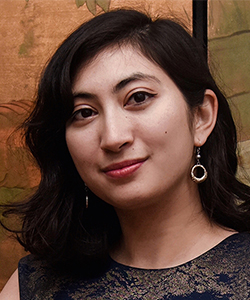Join us for a free one-day workshop for educators at the Japanese American National Museum, hosted by the USC U.S.-China Institute and the National Consortium for Teaching about Asia. This workshop will include a guided tour of the beloved exhibition Common Ground: The Heart of Community, slated to close permanently in January 2025. Following the tour, learn strategies for engaging students in the primary source artifacts, images, and documents found in JANM’s vast collection and discover classroom-ready resources to support teaching and learning about the Japanese American experience.
Video: Made in Hollywood, Censored by Beijing
PEN America's new report examines the ways in which Beijing’s censors have affected and influenced Hollywood and the global filmmaking industry. Panelists discuss pressures filmmakers confront and the choices they make in order to have their films be shown in China.

China is the world’s second largest film market and is a vital market for many American films. China’s government also has content restrictions and a state review process for films to be exhibited there. How do American film producers cope with those hurdles? Is Chinese censorship shaping what gets made and distributed, even outside of China?
PEN America, an organization long dedicated to supporting freedom of expression, examines these questions in its new report Made in Hollywood, Censored by Beijing: The US Film Industry and Chinese Government Influence. This report is the latest of PEN America’s set of reports on Chinese governmental constraints on freedom of expression. One of those reports, on social media censorship, was discussed at USC in 2018. In this report, PEN America concludes that self-censorship concerning China is increasingly the new normal for Hollywood professionals, with significant consequences for artistic expression and for the filmmaking profession.
Click here to read the full report.
The video is also available at our YouTube channel (subscribe!).
Panelists
 Rebecca Davis is the China bureau chief for Variety, where her beat includes the relationship between Beijing and Hollywood. Formerly reporting with Agence France-Presse, Davis covered breaking news on topics ranging from politics to natural disasters, such as earthquakes and landslides in Sichuan, and has written features on culture and lifestyle, including the dashed Oscar hopes of a Chinese documentary about an activist fighting on behalf of sexually abused children. A fluent Mandarin speaker, she has also worked in the Beijing offices of The New York Times and Le Monde.
Rebecca Davis is the China bureau chief for Variety, where her beat includes the relationship between Beijing and Hollywood. Formerly reporting with Agence France-Presse, Davis covered breaking news on topics ranging from politics to natural disasters, such as earthquakes and landslides in Sichuan, and has written features on culture and lifestyle, including the dashed Oscar hopes of a Chinese documentary about an activist fighting on behalf of sexually abused children. A fluent Mandarin speaker, she has also worked in the Beijing offices of The New York Times and Le Monde.
 Aynne Kokas is an Assistant Professor of Media Studies at the University of Virginia. Kokas’ work focuses on the intersections between Chinese and US media and technology industries. Her book, Hollywood Made in China (University of California Press 2017), examines the cultural, political and economic implications of US media investment in China as it becomes the world’s largest film market. Watch Professor Kokas’s book talk at USC.
Aynne Kokas is an Assistant Professor of Media Studies at the University of Virginia. Kokas’ work focuses on the intersections between Chinese and US media and technology industries. Her book, Hollywood Made in China (University of California Press 2017), examines the cultural, political and economic implications of US media investment in China as it becomes the world’s largest film market. Watch Professor Kokas’s book talk at USC.
 Stanley Rosen teaches political science, specializing in Chinese politics and society. He has been the editor (now coeditor) of Chinese Education & Society since 1983. His most recent books include Chinese Politics: State, Society and the Market (2010, co-edited with Peter Hays Gries) and Art, Politics and Commerce in Chinese Cinema (2010, co-edited with Ying Zhu). He is currently co-editing a book on China’s soft power and frequently comments on issues facing Hollywood films in China. Watch Professor Rosen’s presentation on China’s efforts to build its soft power and read his op-ed on Wang Jianlin, chairman of Dalian Wanda Group.
Stanley Rosen teaches political science, specializing in Chinese politics and society. He has been the editor (now coeditor) of Chinese Education & Society since 1983. His most recent books include Chinese Politics: State, Society and the Market (2010, co-edited with Peter Hays Gries) and Art, Politics and Commerce in Chinese Cinema (2010, co-edited with Ying Zhu). He is currently co-editing a book on China’s soft power and frequently comments on issues facing Hollywood films in China. Watch Professor Rosen’s presentation on China’s efforts to build its soft power and read his op-ed on Wang Jianlin, chairman of Dalian Wanda Group.
 James Tager is deputy director of free expression research and policy at PEN America, and the primary report author for Made In Hollywood, Censored By Beijing. At PEN America, Tager has spearheaded major advocacy campaigns on freedom of expression in China and engaged in individual case advocacy for dozens of imprisoned Chinese writers, artists, and others. He has also led PEN America’s previous major research efforts on China: Forbidden Feeds (2018), Darkened Screen (2016), and Writing on the Wall (2016). Tager previously worked with the International Commission of Jurists—Asia & Pacific Program, first as a Satter Human Rights Fellow and subsequently as an international associate legal advisor.
James Tager is deputy director of free expression research and policy at PEN America, and the primary report author for Made In Hollywood, Censored By Beijing. At PEN America, Tager has spearheaded major advocacy campaigns on freedom of expression in China and engaged in individual case advocacy for dozens of imprisoned Chinese writers, artists, and others. He has also led PEN America’s previous major research efforts on China: Forbidden Feeds (2018), Darkened Screen (2016), and Writing on the Wall (2016). Tager previously worked with the International Commission of Jurists—Asia & Pacific Program, first as a Satter Human Rights Fellow and subsequently as an international associate legal advisor.
Moderated by Clayton Dube, USC U.S.-China Institute
This event was co-sponsored by PEN America.

Featured Articles
Please join us for the Grad Mixer! Hosted by USC Annenberg Office of International Affairs, Enjoy food, drink and conversation with fellow students across USC Annenberg. Graduate students from any field are welcome to join, so it is a great opportunity to meet fellow students with IR/foreign policy-related research topics and interests.
RSVP link: https://forms.gle/1zer188RE9dCS6Ho6
Events
Hosted by USC Annenberg Office of International Affairs, enjoy food, drink and conversation with fellow international students.
Join us for an in-person conversation on Thursday, November 7th at 4pm with author David M. Lampton as he discusses his new book, Living U.S.-China Relations: From Cold War to Cold War. The book examines the history of U.S.-China relations across eight U.S. presidential administrations.




